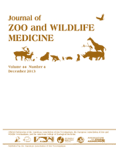
JOURNAL OF ZOO AND WILDLIFE MEDICINE
Scope & Guideline
Connecting professionals for the care of wild species.
Introduction
Aims and Scopes
- Clinical Veterinary Medicine:
Research articles often focus on clinical case studies, diagnostic techniques, and treatment protocols for various species, providing insights into the veterinary care of animals in zoos and wildlife rehabilitation centers. - Pathology and Disease Management:
The journal covers studies on pathological findings, disease prevalence, and management strategies for both common and rare wildlife diseases, contributing to improved health outcomes for affected populations. - Conservation Medicine:
The intersection of wildlife health and conservation efforts is a key focus, with articles discussing the impact of environmental changes, human interactions, and disease dynamics on wildlife populations. - Pharmacology and Anesthesia:
Research on pharmacokinetics, anesthetic protocols, and drug efficacy in various species is prevalent, aiding in the development of safe and effective veterinary practices. - Epidemiology and Public Health:
The journal addresses zoonotic diseases and their implications for public health, emphasizing the importance of monitoring wildlife health as part of broader epidemiological studies. - Innovative Diagnostic Techniques:
Papers often explore advanced diagnostic methods and technologies, such as imaging techniques and laboratory diagnostics, enhancing the ability to assess wildlife health.
Trending and Emerging
- One Health Approach:
There is an increasing emphasis on the One Health paradigm, which integrates human, animal, and environmental health. Publications exploring zoonotic diseases and their implications for both wildlife and human populations are gaining prominence. - Advancements in Anesthesia and Pain Management:
Research related to refined anesthesia protocols and pain management strategies is trending, reflecting an enhanced focus on animal welfare and the need for effective sedation methods. - Genomic and Molecular Studies:
Emerging research utilizing genomic and molecular techniques to understand disease mechanisms and biodiversity is becoming more prevalent, paving the way for personalized veterinary medicine. - Veterinary Telemedicine:
With advancements in technology, there is a growing interest in telemedicine applications for wildlife health monitoring, providing innovative solutions for veterinary care in remote or inaccessible areas. - Conservation Strategies and Management:
Studies focusing on conservation medicine, habitat management, and the effects of climate change on wildlife health are increasingly significant, reflecting the urgency of addressing global biodiversity challenges.
Declining or Waning
- Traditional Surgical Techniques:
There is a noticeable decrease in articles focused solely on traditional surgical methods, as the journal shifts towards reporting on advanced and minimally invasive techniques. - General Wildlife Observation Studies:
Research that primarily documents wildlife behavior without a direct link to health or veterinary care is becoming less common, indicating a shift towards more applied research. - Invasive Research Methods:
The journal reflects a growing trend towards ethical considerations and non-invasive techniques, leading to a decline in studies employing invasive methods for data collection. - Single-Species Focus:
There is a waning interest in studies that focus exclusively on single species without comparative analyses, as the journal increasingly favors research that encompasses multi-species or ecosystem-level perspectives.
Similar Journals
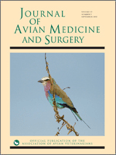
JOURNAL OF AVIAN MEDICINE AND SURGERY
Advancing avian health through innovative research.JOURNAL OF AVIAN MEDICINE AND SURGERY, published by the Association of Avian Veterinarians, serves as an essential resource for professionals and researchers in the field of avian veterinary medicine. Established in 1996, the journal has consistently contributed to the understanding and advancement of medical and surgical practices in avian species, showcasing innovative research and comprehensive reviews that address the unique health challenges faced by birds. With an ISSN of 1082-6742 and an E-ISSN of 1938-2871, this journal is indexed in Scopus, ranking 13th out of 20 in the Small Animals category, placing it within the 37th percentile and exemplifying its impact in the veterinary community. Although not an Open Access journal, it is vital for advancing knowledge and improving veterinary care for avian clients. Its commitment to excellence is reflected in its designation within the Q3 quartile in both miscellaneous medicine and small animals, indicating its growing influence and relevance in the veterinary literature. The journal encourages contributions that enhance the understanding of avian health, providing a platform for ideas that will drive progress in this niche field.

Journal of the Hellenic Veterinary Medical Society
Connecting researchers and practitioners for animal welfare.Welcome to the Journal of the Hellenic Veterinary Medical Society, a premier platform dedicated to advancing the field of veterinary medicine through high-quality research and scholarly discourse. Published by the Hellenic Veterinary Medical Society, this journal serves as a vital resource for veterinarians, researchers, and students who are committed to the advancement of animal health and welfare. With an ISSN of 1792-2720 and a recognized status in the community, the journal publishes impactful studies that contribute to the understanding of various veterinary disciplines. Although the journal currently sits in Q3 of the Veterinary (miscellaneous) category with a Scopus ranking of #157/194, it aims to elevate its reach and impact within the scientific community, fostering a culture of innovation and knowledge sharing. The journal strictly adheres to open access principles, ensuring that its findings are readily available to all, thereby promoting collaboration and comprehensive learning. By participating in this esteemed journal, authors and researchers contribute to the rich history and ongoing dialogue of veterinary science that dates back to its founding in 1953. We invite you to explore, engage, and contribute to the growing body of knowledge in veterinary medicine.

CANADIAN JOURNAL OF VETERINARY RESEARCH-REVUE CANADIENNE DE RECHERCHE VETERINAIRE
Advancing Veterinary Science for a Healthier TomorrowCanadian Journal of Veterinary Research - Revue Canadienne de Recherche Vétérinaire is a leading publication in the veterinary science community, published by the Canadian Veterinary Medical Association. Established in 1986, the journal serves as a crucial resource for researchers and practitioners alike, covering a broad spectrum of topics pertinent to veterinary medicine and animal health. With a current impact factor placing it in Q2 in the Veterinary (miscellaneous) category, it holds a rank of #85 out of 194 in Scopus for general veterinary research, demonstrating its influence and importance within the field. While the journal is not open access, it remains committed to the dissemination of high-quality research that fosters advancements in veterinary practice and education. Based in Ottawa, Canada, it strives to connect the international community of veterinary researchers and professionals through rigorous peer-reviewed articles that advance knowledge and methodologies in veterinary science.
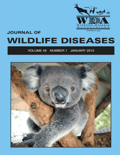
JOURNAL OF WILDLIFE DISEASES
Unraveling the complexities of wildlife health challenges.JOURNAL OF WILDLIFE DISEASES, published by the WILDLIFE DISEASE ASSOCIATION, INC, is a premier, peer-reviewed journal dedicated to advancing the understanding of wildlife diseases and their implications for ecosystems and public health. Since its inception in 1970, this journal has served as a crucial platform for researchers and professionals within the fields of ecology and wildlife management, currently maintaining a credible Q2 ranking in Ecology and a Q3 ranking in Ecology, Evolution, Behavior and Systematics as of 2023. With an ISSN of 0090-3558 and an E-ISSN of 1943-3700, the journal encompasses a wide range of topics, from disease dynamics to the conservation of wildlife populations. This journal is recognized for its valuable contributions to the ecological and environmental sciences, supporting evidence-based approaches to wildlife management. While it does not offer open access, the JOURNAL OF WILDLIFE DISEASES continues to impact the scientific community and policy-making through its rigorous publications. As such, it remains an essential resource for those committed to understanding and addressing the complex challenges of wildlife health.
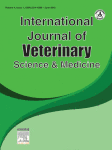
International Journal of Veterinary Science and Medicine
Advancing veterinary knowledge for a healthier world.Welcome to the International Journal of Veterinary Science and Medicine, a leading platform for the dissemination of innovative research in the field of veterinary science. Published by TAYLOR & FRANCIS LTD, this esteemed journal has maintained an Open Access policy since 2013, ensuring widespread accessibility and engagement with cutting-edge veterinary studies. With an impressive impact factor and a Category Quartile ranking of Q1 in Veterinary (miscellaneous) as of 2023, it stands out as one of the top journals in its field, ranking #16 out of 194 in the Scopus Veterinary category, placing it in the 92nd percentile of academic publications. The journal encourages submissions of high-quality research and articles that contribute to advancements in veterinary medicine, ranging from clinical studies to public health implications. Located in the United Kingdom, the journal aims to foster collaboration and communication among veterinary professionals, researchers, and students, making it an indispensable resource for anyone involved in this vital field.
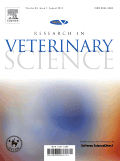
RESEARCH IN VETERINARY SCIENCE
Transforming Animal Care Through Groundbreaking StudiesRESEARCH IN VETERINARY SCIENCE, published by Elsevier Science Ltd, stands as an authoritative platform in the field of veterinary studies. With its origins dating back to 1965, this prestigious journal is recognized for its contribution to the advancement of veterinary knowledge and practices, boasting a remarkable Q1 categorization in Veterinary (miscellaneous) and ranking 24th out of 194 in the Scopus veterinary general category, placing it in the top 13% of its field. The journal presents a diverse range of research articles that explore critical topics in veterinary science, thereby facilitating evidence-based practices and innovations. Although currently not an open-access journal, it remains highly accessible through institutional and personal subscriptions, allowing researchers, professionals, and students to benefit from its rich collection of studies. As it moves toward 2024, RESEARCH IN VETERINARY SCIENCE continues to be a vital resource for those dedicated to improving animal health and advancing veterinary science.

Journal of Zoo and Aquarium Research
Exploring the depths of zoology and aquatic sciences.Journal of Zoo and Aquarium Research is an esteemed publication dedicated to advancing the field of zoology and aquatic sciences. Published by the European Association of Zoos & Aquaria (EAZA), this journal provides a dynamic platform for sharing groundbreaking research, best practices, and conservation efforts within zoos and aquariums, making it an invaluable resource for researchers, professionals, and students alike. With an increasing focus on the importance of biodiversity and sustainable practices, the journal is committed to fostering scholarly communication that enhances the understanding of animal care, species conservation, and habitat preservation. Although specific metrics such as impact factor and HIndex are currently unavailable, the journal's rigorous peer-review process ensures that only high-quality research is disseminated. As an open-access publication, the Journal of Zoo and Aquarium Research promotes accessibility to vital information, encouraging a broader engagement with critical issues in wildlife conservation. By addressing contemporary challenges in the field, this journal stands as a pivotal resource for those dedicated to promoting animal welfare and ecological sustainability.

ISRAEL JOURNAL OF VETERINARY MEDICINE
Cultivating Insights for a Brighter Future in Animal HealthThe Israel Journal of Veterinary Medicine, published by the Israel Veterinary Medical Association, serves as a vital resource for researchers, professionals, and students in the fields of veterinary medicine and animal science. With a commitment to advancing knowledge across diverse veterinary disciplines, this journal plays a crucial role in disseminating significant findings and innovations that influence both local and global veterinary practices. Although it currently holds a Q4 ranking in both the Animal Science and Zoology and Veterinary (miscellaneous) categories, the journal's open access policy, enabling free availability of articles, aspires to increase its accessibility and engagement among the academic community. The journal's convergence of research from 2007 to 2024 showcases its dedication to continuously contributing to the evolving landscape of veterinary science.
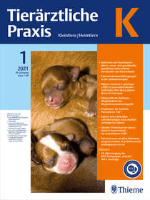
TIERAERZTLICHE PRAXIS AUSGABE KLEINTIERE HEIMTIERE
Transforming pet care through dedicated scholarship.TIERAERZTLICHE PRAXIS AUSGABE KLEINTIERE HEIMTIERE, published by GEORG THIEME VERLAG KG, is a leading journal in the field of veterinary medicine, particularly focusing on small companion animals. With an ISSN of 1434-1239 and E-ISSN 2567-5842, this esteemed publication has been a vital resource for clinicians, researchers, and students since its inception in 1997. The journal operates within a categorized rank of Q3 in Small Animals for the year 2023, placing it among the notable resources in its niche. Although it offers no open access options, the journal compiles comprehensive research, case studies, and clinical guidelines that are indispensable for advancing veterinary knowledge and practices. With a dedicated focus on the dynamics of small animal care and the latest developments in treatment methodologies, TIERAERZTLICHE PRAXIS AUSGABE KLEINTIERE HEIMTIERE serves as an essential platform for disseminating innovative veterinary science that significantly contributes to the well-being of our beloved pets.

Animals
Transforming animal welfare through groundbreaking studies.Animals is an esteemed open-access journal published by MDPI, focusing on the dynamic fields of Animal Science and Zoology, as well as Veterinary Sciences. Established in 2011, it has quickly garnered a prominent reputation, achieving Q1 rankings in both Animal Science and Veterinary (Miscellaneous) categories in 2023. With an impressive Scopus ranking placing it in the top 15% of Veterinary journals and the top 13% in Animal Science, Animals serves as a vital platform for researchers and professionals to disseminate and share innovative studies that advance knowledge in animal biology, husbandry, welfare, and veterinary care. By promoting open access since its inception, the journal ensures unrestricted availability of cutting-edge research to a global audience, fostering collaboration and inspiring further studies in the field. Located in the heart of Switzerland, at St. Alban-Anlage 66, Basel, Animals is essential for anyone dedicated to understanding and enhancing the welfare and management of animals across various disciplines.